Minnesota Poised To Ban Christians, Muslims, And Jews From Teaching In Public Schools
Minnesota will soon ban faithful Christians, Muslims, and Jews from teaching in public schools by requiring that every state-certified teacher “fosters an environment that ensures student identities such as … gender identity … are … affirmed.” Once the new requirements clear a final procedural hurdle, they will be immediately challenged in state and possibly federal court, a civil liberties lawyer told The Federalist on Tuesday.
“We have lots of parents who are upset by this sort of thing in schools already,” said Doug Seaton, president of Minnesota’s Upper Midwest Law Center, in an interview. “They’re going to be even more upset with how their teachers are going to be licensed. Their teachers are going to have to be faced with hiding their beliefs or getting denied [for a state teaching license].”
Seaton said it was accurate to describe the nearly finalized regulations as communicating: “Christians, Muslims, and Jews need not apply for Minnesota teaching jobs.” That is unconstitutional, he said, so UMLC plans to sue once the changes go into effect.
The state agency that composed the changes disputed they would effectively ban religious Americans from teaching in Minnesota schools through a spokeswoman on Wednesday. The spokeswoman did not respond to a follow-up asking how Christians, Jews, and Muslims could adhere to their faith while complying with the licensing requirements that all new teachers publicly reject their faiths’ declaration that God has created only two sexes, male and female.
Minnesota’s Professional Educator Licensing and Standards Board (PELSB), a division of the state Department of Education, has been working to change teacher certification requirements since 2019. Its latest public draft, which is finalized save for a few tweaks that don’t affect the content, includes multiple requirements that licensure candidates publicly support critical race theory and transgender ideology and include both in their teaching. Teachers must receive state licensure to be employed in Minnesota public and many private schools.
PELSB justified its changes by claiming “the predominantly white teacher workforce must be equipped to understand their own implicit bias and the unique lived experiences of all their students as a core requirement of teaching. For this reason, PELSB has worked closely with a wide range of stakeholders, including researchers and experts in the field of pedagogy, to ensure that anti-racism, cultural competency, and implicit bias were effectively embedded and identified throughout the scope of the proposed Standards of Effective Practice” (page 62).
“Standards for effective teaching” 1A in the nearly finalized regulations requires a teacher candidate to “affirm[] the validity of students’ backgrounds and identities.”
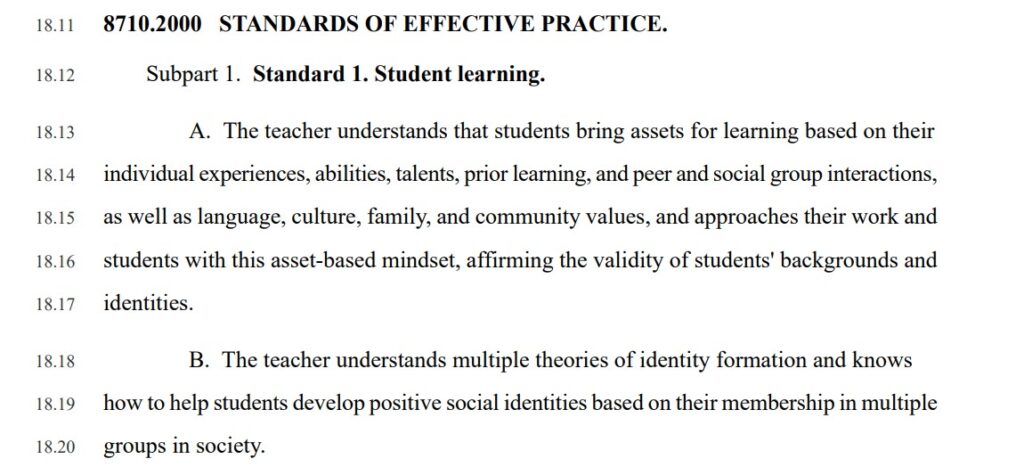
Standard 2D requires that a licensed teacher “fosters an environment that ensures student identities such as race/ethnicity … sex and gender, gender identity, sexual orientation … are historically and socially contextualized, affirmed, and incorporated into a learning environment where students are empowered to learn…”
Standard 2F mandates that “The teacher communicates verbally and nonverbally in ways that demonstrate respect for and responsiveness to the cultural backgrounds and differing perspectives learners bring to the learning environment.”
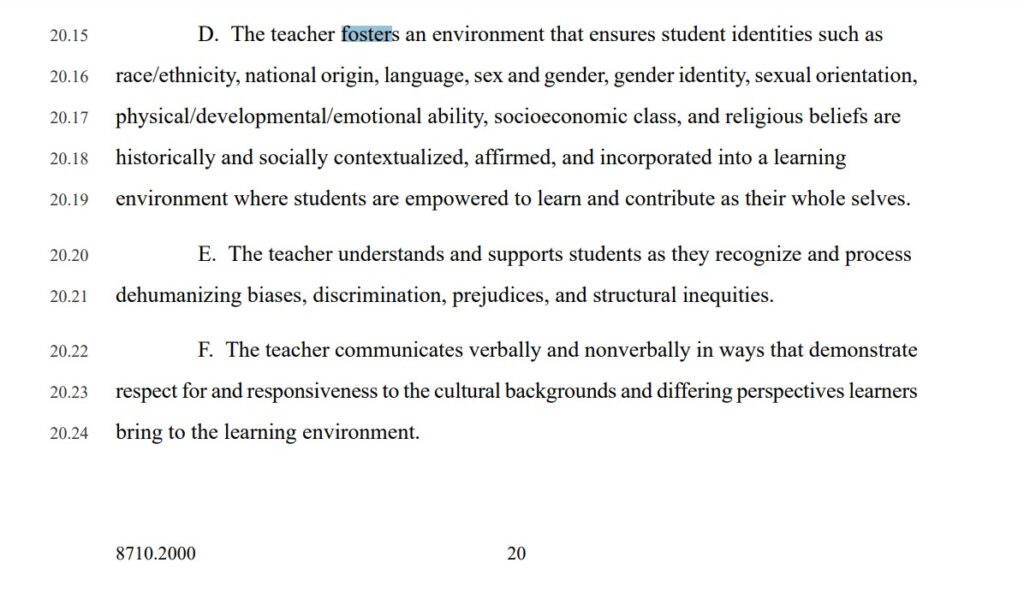
Standards 6, A-G require teachers to agree that the taxpayers supplying their salaries and the people who created the school system that will employ them are racists, and affirm other cultural Marxist beliefs. For example, Standard 6C requires that “The teacher understands the historical foundations of education in Minnesota … that have and continue to create inequitable opportunities, experiences, and outcomes for learners … especially for … students historically denied access, underserved, or underrepresented on the basis of race … gender, sexual orientation.”
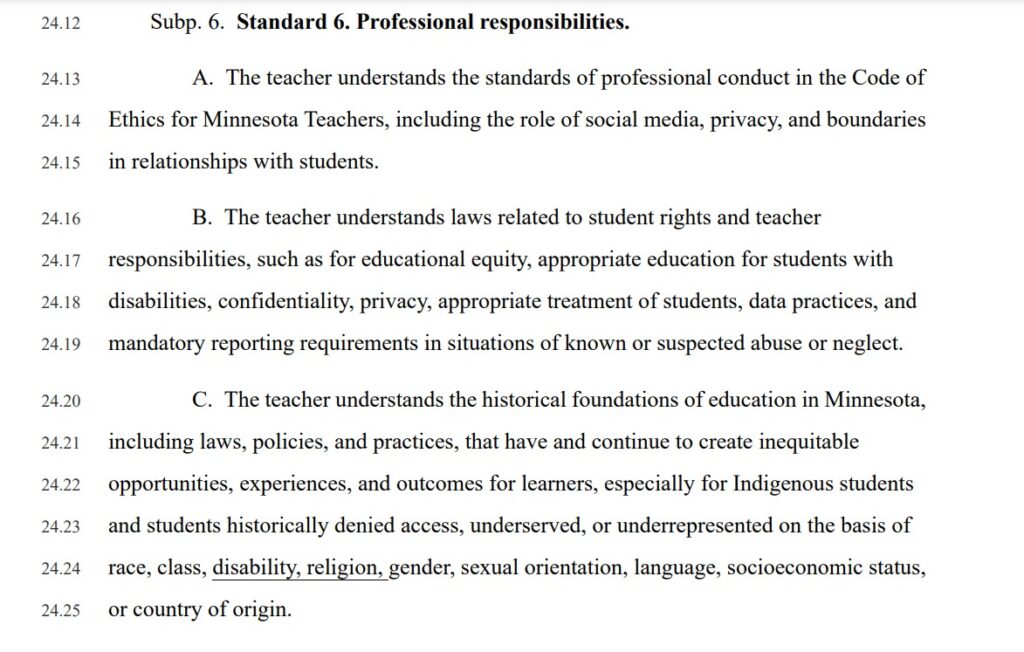
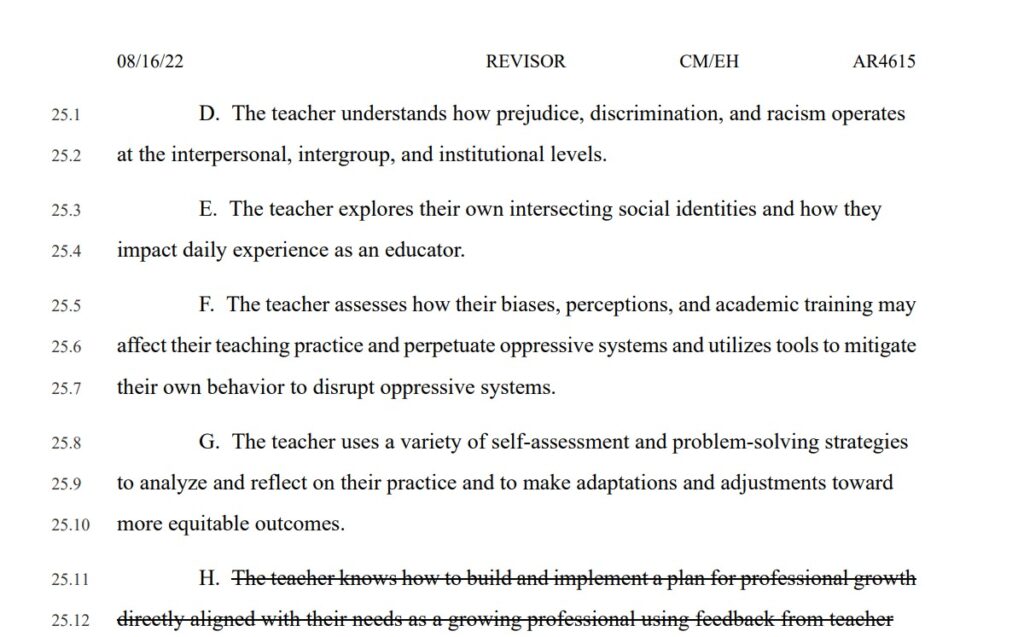
The standards also require teachers to instruct their students in critical race theory, in mandates that teachers promote “anti-racism” and “equity.” Those two terms are defined by their advocates to mean instituting structural racism against people with comparatively lighter skin and using skin color to judge people’s merit and performance. See standards 4E and H, below (standard 4F below has been slightly revised).
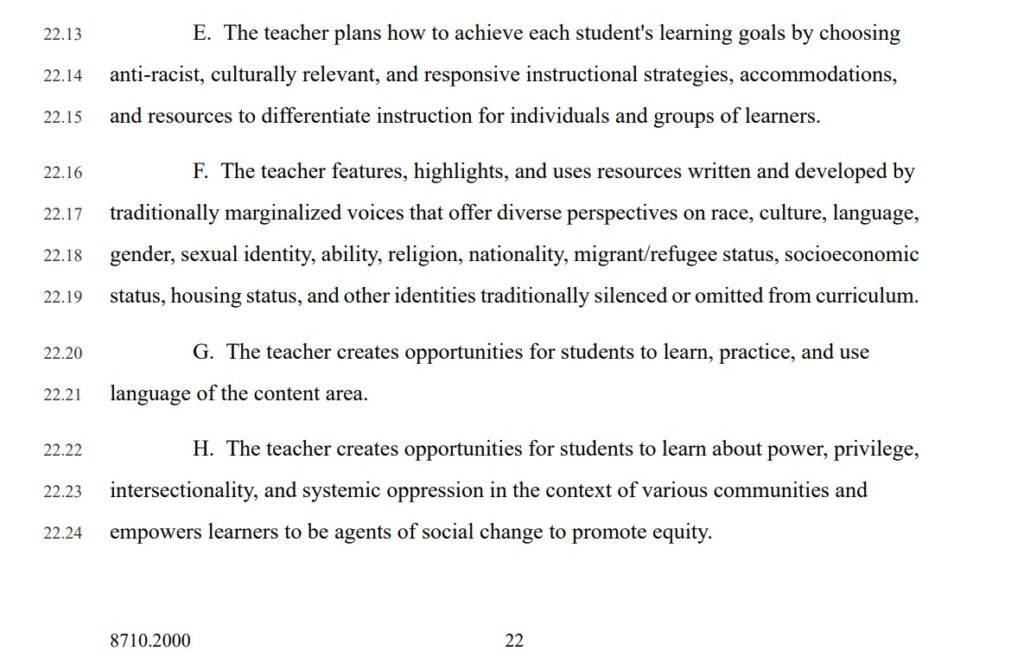
Before the licensure changes can go into effect, they must be reviewed once more by an administrative law judge. The judge already reviewed the proposal and recommended four tweaks that do not change the content of the requirements, merely their wording, to comply with regulatory technicalities.
Since the board made the changes he requested, the judge is likely to approve the tweaked draft PELSB sent back to him on Dec. 16, 2022, Seaton said. PELSB expects these licensing changes to go into effect at the latest by this spring, its spokeswoman told The Federalist.
“[T]he PELSB has made it impossible for those practicing orthodox Christianity and Judaism, as just two examples, to freely exercise their religion and simultaneously hold a teaching license. It makes it impossible for those colleges who seek to teach students how to teach to also maintain a distinctly orthodox Christian message on this key tenet of orthodox Christianity. It compels potential licensees to speak the PELSB’s chosen beliefs as an established creed and live them out in order to have a job. It establishes the PELSB’s view of human sexuality and gender as orthodoxy despite sincere opposition based on biological reality and traditional orthodox theistic beliefs,” Seaton noted in written comments to the administrative law judge who approved nearly all the standards in December.
PELSB’s members are appointed by the governor, Tim Walz, a Democrat who was re-elected in 2022. After Minnesotans filled up public meetings to protest these licensure changes in fall 2022, PELSB told news outlets the changes will only apply to new license candidates, not renewals. State-licensed Minnesota teachers must renew their licenses every one to five years.
“They have claimed this won’t apply to renewals, but the statute says it will,” Julie Quist, chairwoman of Minnesota’s Child Protection League, told The Federalist. “So they came out after all the criticism [to say] that this doesn’t apply to renewals, but the statute hasn’t been changed. They can say they’re not going to enforce it, but that means they can change their mind any time they want to.”
Minnesota already requires all teachers to take classes in “cultural competency” to renew their licenses, a change that went into effect in 2020. Those classes include training on “bias” regarding “sexual orientation” and “gender identity.”
College teacher preparation programs in Minnesota will also have to comply with these new requirements, PELSB has noted. That sets up another constitutional conflict by requiring religious institutions to endorse behaviors and ideologies that conflict with their public confessions of faith, Seaton said.
“We have people in other employment settings who are being presented with this, this affirmation and carrying the flag for these ideas,” Seaton said. “So we have people who are quitting and being terminated and disciplined already in Minnesota” over being forced to publicly agree with critical race theory and transgender ideology in order to keep their jobs.
PELSB noted that many teacher preparation programs in Minnesota have already adopted these changes: “the new standards are already embedded into their programs.” The state university system has embarked on an “Equity 2030” campaign across all majors that demands “faculty must find a way to engineer identical outcomes among all demographic groups,” according to Center of the American Experiment Senior Policy Fellow Katherine Kersten.
“We see a left-wing capture of school boards and educational agencies all over the country, even in red states,” Seaton noted. “So I think it is likely this thing will be seen in other parts of the country as well.”
The Upper Midwest Law Center is seeking plaintiffs for its legal challenges to the new licensing regime, Seaton said, such as religious students studying to become public school teachers and Christian colleges that currently participate in the state’s teacher licensing programs.
“Many people don’t understand how far along we are, but there’s no question that’s how far along we are because it’s in statute now. And I don’t know exactly how we’re going to turn this around but we’re committed to it,” Quist said.
Quist said one place to start would be for private institutions to develop teacher training and certification programs and for religious and other schools to use such independent programs instead of state certification. She also suggested that churches, community organizations, and foundations get more serious about starting and funding private alternatives to public schools so children can get an indoctrination-free education.





Comments are closed.